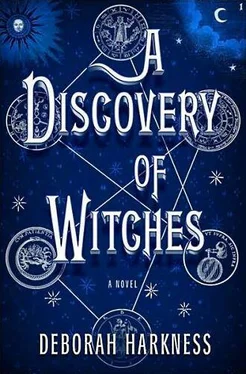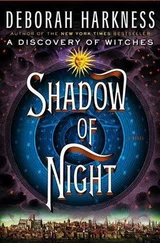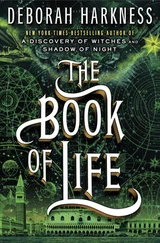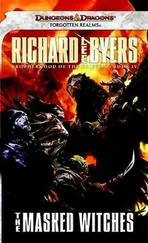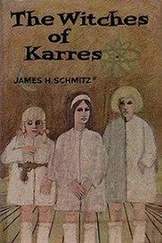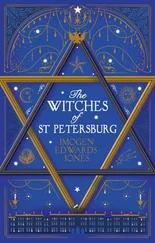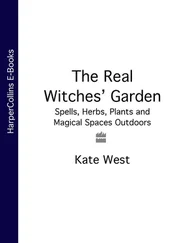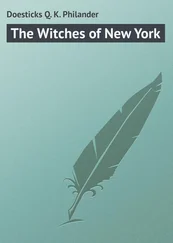“He’ll laugh like a fool when he hears that was your reaction,” Matthew commented.
“Is this what I think it is?”
“Probably.”
“How did you get it?”
“Kit gave it to me.” Matthew touched the cover lightly. “Faustus was always my favorite.”
Every historian of alchemy knew Christopher Marlowe’s play about Dr. Faustus, who sold his soul to the devil in exchange for magical knowledge and power. I opened the book and ran my fingers over the inscription while Matthew continued.
“Kit and I were friends—good friends—in a dangerous time when there were few creatures you could trust. We raised a certain amount of hell and eyebrows. When Sophie pulled the chess piece I’d lost to him from her pocket, it seemed clear that England was our destination.”
The feeling my fingertips detected in the inscription was not friendship, however. This was a lover’s dedication.
“Were you in love with him, too?” I asked quietly.
“No,” Matthew said shortly. “I loved Kit, but not the way you mean, and not in the way he wanted. Left to Kit, things would have been different. But it wasn’t up to him, and we were never more than friends.”
“Did he know what you are?” I hugged the book to my chest like a priceless treasure.
“Yes. We couldn’t afford secrets. Besides, he was a daemon, and an unusually perceptive one at that. You’ll soon discover it’s pointless trying to keep anything from Kit.”
That Christopher Marlowe was a daemon made a certain sense, based on my limited knowledge of him.
“So we’re going to England,” I said slowly. “When, exactly?”
“To 1590.”
“Where?”
“Every year a group of us met at the Old Lodge for the old Catholic holidays of All Saints and All Souls. Few dared to celebrate them, but it made Kit feel daring and dangerous to commemorate them in some way. He would read us his latest draft of Faustus—he was always fiddling with it, never satisfied. We’d drink too much, play chess, and stay awake until dawn.” Matthew drew the manuscript from my arms. He rested it on the table and took my hands in his. “Is this all right with you, mon coeur? We don’t have to go. We can think of sometime else.”
But it was already too late. The historian in me had started to process the opportunities of life in Elizabethan England.
“There are alchemists in England in 1590.”
“Yes,” he said warily. “None of them particularly pleasant to be around, given the mercury poisoning and their strange work habits. More important, Diana, there are witches—powerful witches, who can guide your magic.”
“Will you take me to the playhouses?”
“Could I keep you from them?” Matthew’s brows rose.
“Probably not.” My imagination was caught by the prospect opening before us. “Can we walk through the Royal Exchange? After they light the lamps?”
“Yes.” He drew me into his arms. “And go to St. Paul’s to hear a sermon, and to Tyburn for an execution. We’ll even chat about the inmates with the clerk at Bedlam.” His body shook with suppressed laughter. “Good Lord, Diana. I’m taking you to a time when there was plague, few comforts, no tea, and bad dentistry, and all you can think about is what Gresham’s Exchange looked like at night.”
I pulled back to look at him with excitement. “Will I meet the queen?”
“Absolutely not.” Matthew pressed me to him with a shudder. “The mere thought of what you might say to Elizabeth Tudor—and she to you— makes my heart falter.”
“Coward,” I said for the second time that night.
“You wouldn’t say so if you knew her better. She eats courtiers for breakfast.” Matthew paused. “Besides, there’s something else we can do in 1590.”
“What’s that?”
“Somewhere in 1590 there’s an alchemical manuscript that will one day be owned by Elias Ashmole. We might look for it.”
“The manuscript might be complete then, its magic unbroken.” I extricated myself from his arms and sat back against the cushions, staring in wonder at the three objects on the coffee table. “We’re really going to go back in time.”
“We are. Sarah told me we had to be careful not to take anything modern into the past. Marthe made you a smock and me a shirt.” Matthew reached into the briefcase again and pulled out two plain linen garments with long sleeves and strings at the neck. “She had to sew them by hand, and she didn’t have much time. They’re not fancy, but at least we won’t shock whomever we first meet.”
He shook them out, and a small, black velvet bag fell from their linen folds.
Matthew frowned. “What’s this?” he said, picking it up. A note was pinned to the outside. He opened it. “From Ysabeau. ‘This was an anniversary gift from your father. I thought you might like to give it to Diana. It will look old-fashioned but will suit her hand.’”
The bag held a ring made of three separate gold bands twisted together. The two outer bands were fashioned into ornate sleeves, colored with enamel and studded with small jewels to resemble embroidery. A golden hand curved out of each sleeve, perfectly executed down to the tiny bones, slender tendons, and minute fingernails.
Clasped between the two hands, on the inner ring, was a huge stone that looked like glass. It was clear and unfaceted, set in a golden bezel with a black painted background. No jeweler would put a hunk of glass in a ring so fine. It was a diamond.
“That belongs in a museum, not on my finger.” I was mesmerized by the lifelike hands and tried not to think about the weight of the stone they held.
“My mother used to wear it all the time,” Matthew said, picking it up between his thumb and index finger. “She called it her scribble ring because she could write on glass with the point of the diamond.” His keen eyes saw some detail of the ring that mine did not. With a twist of the golden hands, the three rings fanned out in his palm. Each band was engraved, the words twining around the flat surfaces.
We peered at the tiny writing.
“They’re poesies—verses that people wrote as tokens of affection. This one says ‘a ma vie de coer entier,’ ” Matthew said, the tip of his index finger touching the gold surface. “It’s old French for ‘my whole heart for my whole life.’ And this, ‘mon debut et ma fin,’ with an alpha and an omega.”
My French was good enough to translate that—“my beginning and my end.”
“What’s on the inner band?”
“It’s engraved on both sides.” Matthew read the lines, turning the rings over as he did so. “‘Se souvenir du passe, et qu’il ya un avenir.’ ‘Remember the past, and that there is a future.’”
“The poesies suit us perfectly.” It was eerie that Philippe had selected verses for Ysabeau so long ago that could have meaning for Matthew and me today.
“Vampires are also timewalkers of a sort.” Matthew fitted the ring together. He took my left hand and looked away, afraid of my reaction. “Will you wear it?”
I took his chin in my fingers, turning his head toward me, and nodded, quite unable to speak. Matthew’s face turned shy, and his eyes dropped to my hand, still held in his. He slid the ring over my thumb so it rested just above the knuckle.
“With this ring I thee wed, and with my body I thee honor.” Matthew’s voice was quiet, and it shook just a bit. He moved the ring deliberately to my index finger, sliding it down until it met the middle joint. “And with all my worldly goods I thee endow.” The ring skipped over my middle finger and slid home onto the fourth finger of my left hand. “In the name of the Father, and of the Son, and of the Holy Spirit.” He raised my hand to his mouth and his eyes to mine once more, cold lips pressing the ring into my skin. “Amen.”
Читать дальше
